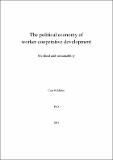| dc.description.abstract | This thesis investigates the potential of the worker cooperative model as the basis for a sustainable mode of production. We explore the economic, social, and environmental sustainability of the worker coop enterprise form vis-à-vis the conventional capitalist firm; as well as the political-economic barriers to scale confronting sustainable worker coop development.
We review the international literature on worker coop development, noting that questions of social and environmental sustainability are relatively underresearched, when compared with the extensive literature on the economic sustainability of worker coops. Furthermore, the relationship between worker coop development initiatives and macro-level political-economic transformation is also relatively understudied. The gaps in the literature call for a greater consideration of the social relations established both within worker coops, and between worker coops and the wider community. A qualitative case study of the worker coop development experience in Ireland during the neoliberal era is carried out on this basis.
Our methodological approach encourages a dialogue between the international literature on worker coop development and our case study results, as mediated through a Marxist political economy lens. We find evidence to support the contention that, in contradistinction to the capitalist firm, worker coops have at least the potential to institute sustainable development. But this ultimately requires the establishment of democratic planning mechanisms between, as well as within, individual worker coops. In terms of the worker coop movement reaching scale, while the economic policy literature emphasises the importance of “getting the (legal, technical, and financial) institutions right”, and the political economy literature emphasises the primacy of the political struggle over state power in this regard, we find that neither branch places sufficient emphasis on the political-cultural movement required to carry through any such transformation. This insight places grassroots worker cooperatives as counter-cultural institutions, and, hence, the primary instigators of cooperative political-economic change. | en_IE |


